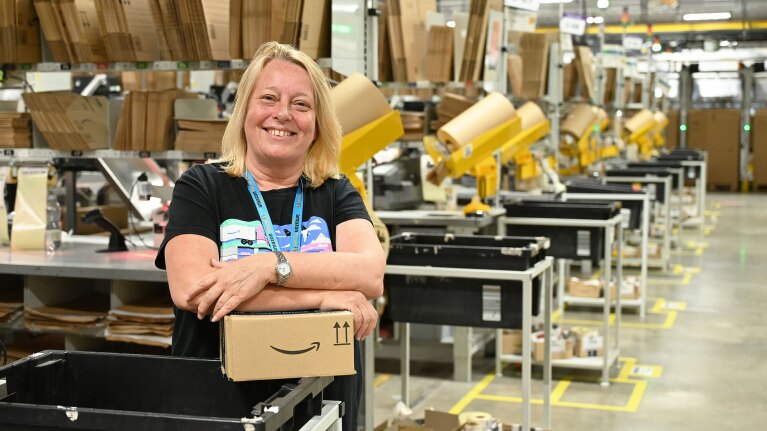Page overview
Prepare for behavioral-based interview questions
Amazon interview questions are behavioral-based. We'll ask about past situations or challenges you've faced and how you handled them. Amazon's Leadership Principles will help us guide the discussion. Cody Nelson, senior manager of recruiting, Worldwide Operations, recommends using the job description to prepare the stories you use to answer these questions. Nelson said, "If you can think of stories and examples related to the requirements in the job description, you will be better prepared to answer the behavioral questions in your interview."
The STAR method is a structured way to respond to behavioral-based interview questions. Following the format, you answer questions by discussing the specific situation, task, action, and result of the experience you're describing. Stacy Milgate, program manager at AWS, suggests laying your stories out in the STAR format ahead of your interview. "Think about all of the details," she said. "Who was involved? What did you do specifically? What were the results based off of what you did? How did you make an impact?"
Once you have your stories ready, practice them in the mirror or with a partner to really nail the answer format in your interview.
"A big miss for many candidates is that they don't dive deep enough," said Rasheeda Liberty, Inclusion, Diversity, & Equity leader at Amazon. When answering questions in your interview, remember that specifics are key. Give a detailed account of one situation for each question you answer, and use data or metrics to support your example. "We want to know the numbers," said Liberty. "We want to know who was working on the project and how you delivered tangible results."
Use "I," when describing actions in your interview answers. "Interviewing is not the time to minimize what you have done," said Michelle Jackson, a senior recruiting business manager at Amazon. "Of course, we understand that you've worked with a team in a collaborative environment, but interviewing is an opportunity for you to sell yourself." Be ready to describe the specific steps you took and how you contributed. Let us know what you actually did.
It's okay to talk about failure. Come prepared with examples that showcase your expertise while describing how you've taken risks, succeeded, failed, and grown in the process. Keep in mind, some of Amazon's most successful programs have roots in failed projects.
"You can't innovate without failure," said Nelson. "Failure isn't a bad thing as long as you improve from the lessons you learned. Understand how you've taken risks in a positive way and be able to communicate that to your interviewer."
Asking "why Amazon?" is not just a formality for us. We want to understand why you're exploring an opportunity with the company so we get a better sense of who you are.
"Many candidates say they're excited about the opportunity to work for a large-scale, innovative company," said Liberty. "What I really want to know is why Amazon fits into your specific career path. We want to know that you're a person who's thinking about how to give back to the organization with what you bring, but we're also looking at what you want to learn while working here."
Don't be shy about asking for clarification. If an interviewer asks you a question and does not give enough information for you to provide a solid answer, ask for more context.
"We ask a lot of questions at Amazon," said Jackson. "We want our candidates to feel comfortable with this because that's the environment and culture we actually have."
Your recruiter may ask you to provide a writing sample. This will depend on the role you're interviewing for, but it isn't necessarily limited to traditional writing roles. Why? One of the unique aspects of Amazon's culture is that we don't do PowerPoint or any other slide-oriented presentations in meetings. We write narratively structured memos and silently read them at the beginning of each meeting. These papers include pertinent information like project goals, tactics, outcomes, and next steps. Because these papers impact our decision making, articulating your thoughts in written format is a necessary skill.
You will meet with between two to seven Amazon employees during your interview process. They will likely be a mix of managers, team members, stakeholders from related teams, and a "Bar Raiser" (usually an objective third party from another team).
The recruiters and hiring managers we talked to recommend bringing notes to help you keep track of the stories you share during each interview. A pen will also be helpful to jot down things like the questions you want to ask at the end or key points you want to hit in the next interview.
Interviewers use Amazon's Leadership Principles to evaluate candidates. Consider how you've applied these principles in your previous professional experience as you practice your stories and responses.
"We're not going to test you to see if you've memorized the Leadership Principles, but we do want candidates to be excited about them," said Milgate. "Questions about the Leadership Principles are meant to help us understand why you want to work here and how our values resonate with you."
Take some time ahead of your interview to tie your stories back to our Leadership Principles, and maybe even identify a few principles that resonate with you most.
Amazon has a peculiar culture centered on customer obsession. As you prepare for your interview, research the company to determine whether Amazon is the right fit for you. Learn more about our culture.
Trending news and stories
- How Amazon proved its new delivery drone is safe for takeoff
- Amazon announces $100 million commitment to affordable housing in the City of Bellevue
- Amazon One rolls out at NYU Langone Health facilities to improve check-in for millions of patients
- Kevin Bacon stars as a demon hunter in the new Prime Video series 'The Bondsman’—watch the trailer















